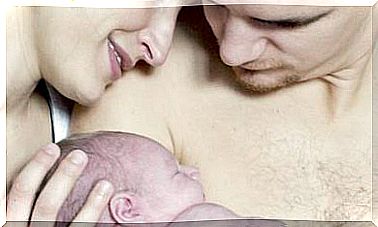Children’s Intelligence Needs Interaction (not Stimulation)
The development of intelligence is a journey in two stages and we make the mistake of giving more importance to the second, which is education, than to the first, the affection of the parents

Intelligence has prestige. Everyone seems to want their children to be very smart. And there are tests that promise to sum up your capabilities with an understandable number.
Although it is certainly not the same to get 80 as 128 (but that difference was already noticeable without the need to do a test, right?), It is absurd to think that the one who gets 128 is smarter than the one who gets 120.
The two stages of intelligence
Intelligence depends on the interaction between heredity and the environment. Without a doubt, there are children who are born with the ability to be geniuses and others who will never stand out. But a genius can only become a genius if he is immersed in a suitable environment.
The development of intelligence is a journey in two stages and currently we make the mistake of giving more importance to the second, to the stage of education, than to the first, that of the first years, where the affection of parents is very important .
Mozart would not have been a musical genius if his father had not been a musician, if there had not been a piano in his house. The world is full of peasants, bricklayers and hairdressers who would have made excellent physics professors or writers, but who did not have the opportunity to study. But that doesn’t stop them from being very smart peasants or hairdressers (and that probably allows them a more fulfilling life than their less savvy peers).
Everyone seems to focus on education: stimulation, study, good schools, prestigious universities … But all that work is useless without the basic intelligence, which has been formed before, by the child’s interaction with those around him. , mainly with the mother.
Interaction for development
Indeed, the first years are fundamental. In The irreducible needs of children , pediatrician TB Brazelton and psychiatrist SI Greenspan point out that infants and toddlers need adult attention throughout their waking hours.
Part of that attention should be direct, face-to-face interaction: looking into his eyes, saying things to him, smiling at him, and being there for him.
Another part of the time, the adult may be available, a little further away, doing other activities but at the same time responding from time to time to the child’s calls or giving directions.
At other times, the adult is just nearby, in the same room, but is.
We do not know in what exact proportion the child needs these three types of relationship. Western children seem to need face-to-face interaction for at least half the time they are awake, although many cultures seem to get the same results by carrying the baby all the time on their back and with little direct interaction.
Maybe our kids need more stimulation because they don’t have enough physical contact
What is certain is that children deprived of adult attention suffer a delay in their development. In the extreme case, semi-abandoned children in orphanages suffer from severe psychomotor deficits and severe psychological problems even though they are clean and well fed.
The myth of early stimulation
For some, the idea that the simple presence of the mother is essential for the development of the baby can be very disturbing. “The mother, like that, without further ado, without studies, without preparation!” “You have to teach the mother to do better!” Thus arose the early stimulation methods.
Be careful, I am not talking about the special stimulation that excellent professionals offer to children with physical and mental problems, and that is undoubtedly very useful. I am talking about the concept of stimulating healthy and normal children with techniques, videos, music and other “educational” materials, in the hope of increasing their intelligence and turning them into geniuses.
In reality, these methods confuse the two stages of the journey that we mentioned earlier. They try to advance to the first years the techniques of education that are used in the school. But intelligence is not formed that way.
The American doctor John T. Bruer, in The Myth of the First Three Years (Ed. Paidós), explains very well the fallacy of this type of early stimulation. If the brain does not develop by itself (as the skeleton grows) but needs a series of stimuli, it is precisely because these stimuli are so universal that all children, simply because they have parents who take care of them, they receive them.
It is not necessary to know special techniques or perform certain activities, it is enough to be there and love your child as it comes from within
6 keys to educate from intelligence
The best way to stimulate intelligence in children is with our example. Behaving intelligently and respecting their intelligence. With love, with respect and with the truth ahead. Thus, the little ones will learn to behave in a similar way.
Avoid contradictions
There are incompatible orders: “Be still and eat!”, “I asked you a question. Don’t be answering! ”… And there are words that are contradicted by the facts, for example, telling a crying child“ Mom and Dad love you very much ”from two meters away and without any attempt to caress or comfort him.
Respect their feelings
The one who is sad is sad and the one who is angry is angry. We cannot say: “Nothing is wrong, you have not hurt yourself” to someone who cries out after a blow; or “If you want to play with Alberto …” whom we just separated because he was trying to strangle Alberto.
It is possible to console or control without being truthful: “Oh, what a damn thing; Come, I’ll give you a little kiss on the pupa ”or“ I know you’re angry with Alberto, but you can’t hit it even if you’re angry ”.
Encourage your expression
Help him express his feelings instead of trying to change them. For example, when you call us at night, we sometimes ask: “What’s wrong?”, “Are you afraid?”, “Does your belly hurt?” In most cases we know that all you want is company. The correct question would be: “What’s wrong, did you miss Mom?” or “You don’t like being alone, do you?”
Otherwise, we are making a fear or pain invent.
Teach to act
Eight-year-old Marta has pushed a little boy. Her father tells her “You can’t do that …”, but Marta is crying and turns her back on him. It is probably not rebellion but shame. She knows she has done something wrong, but she is too young to know what to do in these cases.
Instead of continuing to scold her, we can hug her and teach her how to resolve these situations: “Luisito didn’t like what you’ve done to him; he wants you to be his friend. Do you know what they say?
Find the words
Continuing with the previous example, it is advisable to choose the apology well. If you accidentally hit him while playing, it is logical to apologize: “Sorry, it was accidental.” But if he gave it on purpose, “it was accidentally” would be a lie. Then you can say, “Sorry, I shouldn’t have pushed you.” What if Luisito started the fight and Marta sees no reason to apologize? Well, it could be: “I’m sorry, I shouldn’t have pushed you” (feel it, of course she’s sorry, that’s why she cries, but it’s not the same as asking for forgiveness).
Always tell the truth
Sometimes we lie to our children almost without realizing it. “If you do not eat, you will not grow”, when it will grow the same. We mix values, we say: “What an ugly child” when he misbehaves. We exaggerate, confusing the particular with the general: “You are a bad boy” instead of: “You have done a wrong thing.”
And the most absurd lie: “If you behave badly, I will not love you” instead of: “If you behave badly, I will be angry.” Don’t you see that she will still love him anyway? Well, don’t hide it from him.









